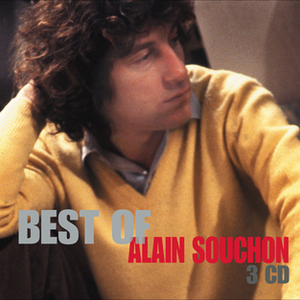Souchon signed his first contract in 1971, but had no success until he began to collaborate with composer/arranger Laurent Voulzy ; they would write together, but each released albums under his own name. Souchon's first hit was "J'ai 10 ans" (1974), from the album of the same name. Souchon's biggest hit was probably "Foule Sentimentale" from 1995's C'est Deja ca. His recent album is from 2005, called La Vie Theodore which features his song "Et si en plus, y'a personne" [What if, even more, there is no one], a song condemning religious intolerance.
He wrote the theme for François Truffaut's 1979 film Love on the Run (L'amour en fuite).
Le dégoût
Alain Souchon Lyrics
Jump to: Overall Meaning ↴ Line by Line Meaning ↴
La nuit, le petit dormeur
S'en allait tout seul dans le noir
Avoir peur
Il aimait pas les gugusses
Qui faisaient rire les imbéciles
Vomissait dans l'autobus
Il attendait dans des églises
Quelque chose de doux
Des baisers, des choses exquises
Sur sa joue
Sur un piano électrique
Si tu l'oses
On peut faire de la musique
De ces choses
Allez, chante fort
Ton chagrin sonore
Jusqu'à ce que ton cœur
Devienne un bloc d'or
Allez chante fort
Mets l'dedans dehors
Chante encore jusqu'à ce que t'es mort
Il a volé autour du monde sur des airs
Racontant content ses contes populaires
Une image, il est devenu, messieurs, dames
Mais les images, c'est connu, n'ont pas d'âme
Allez, chante fort
Ton chagrin sonore
Jusqu'à ce que ton cœur
Devienne un bloc d'or
Allez chante fort
Mets l'dedans dehors
Chante encore jusqu'à ce que t'es mort
Une image, il est devenu
Mais les images, c'est connu
N'ont pas d'âme
N'ont pas d'âme
The lyrics of Alain Souchon's "Le dégoût" speak about the internal struggles of a young boy who finds solace in the darkness of night. The opening lines set the tone of the song with the use of the metaphor "Comme la veilleuse laissait tout voir," which means "As the nightlight showed everything." Here, the nightlight could either represent the comforting darkness or the suffocating brightness of reality. The young boy prefers the former and finds himself wandering in the darkness, feeling scared and alone. The phrase "S'en allait tout seul dans le noir/ Avoir peur" ("He went off alone into the dark/To be scared"), emphasizes how he likes to feel the fear but alludes that he could be looking for something in the dark.
The song's protagonist is introverted, and the lyrics reflect his society's rejection of his introversion. He "N'aimait pas les gugusses qui faisaient rire les imbéciles" ("Didn't like the show-offs who made fools laugh"), highlighting society's marginalization of the boy because of his difference. He is characterized by his disgust, vomiting bile on buses, and finding solace in the quiet of empty churches. These lines can be interpreted as a commentary on society's push for individuals to fit into a particular mold, and the rejection that comes with not doing so.
The chorus, which repeats twice in the song, emphasizes the importance of music as a source of emotional expression. The lyrics seem to suggest that opening oneself up and letting emotions out can be cathartic, and can even turn one's pain (chagrin) into something beautiful and valuable (bloc d'or). The lines, "Allez chante fort/ Mets l'dedans dehors/ Chante encore jusqu'à ce que t'es mort," is a call to the boy to keep singing until he can no longer breathe, which is indicative of how the act of singing can be therapeutic, regardless of the quality of the singing.
Line by Line Meaning
Comme la veilleuse laissait tout voir
As the night light lit the room, the little sleeper felt safe to wander off to the dark world without fear.
S'en allait tout seul dans le noir
He wandered off alone in the darkness.
Avoir peur
Only to feel fear.
Il aimait pas les gugusses
He didn't like the clowns,
Qui faisaient rire les imbéciles
Who delighted the fools.
Vomissait dans l'autobus
He puked on the bus
De la bile
With a mouth full of bile.
Il attendait dans des églises
He waited in churches,
Quelque chose de doux
For something gentle to come his way.
Des baisers, des choses exquises
A kiss or some other exquisite favor.
Sur sa joue
On his cheek.
Sur un piano électrique
On an electric piano.
Si tu l'oses
If you dare,
On peut faire de la musique
You could make music,
De ces choses
Out of these things.
Allez, chante fort
Come on, sing loudly
Ton chagrin sonore
Your sorrowful sounds
Jusqu'à ce que ton cœur
Until your heart
Devienne un bloc d'or
Turns into a block of gold.
Mets l'dedans dehors
Let it out,
Chante encore jusqu'à ce que t'es mort
Sing until you die.
Il a volé autour du monde sur des airs
He flew around the world on tunes.
Racontant content ses contes populaires
Telling his happy popular stories.
Une image, il est devenu, messieurs, dames
He had become an image, ladies and gentlemen,
Mais les images, c'est connu, n'ont pas d'âme
But we all know images have no soul.
N'ont pas d'âme
Have no soul.
Lyrics © Universal Music Publishing Group
Written by: ALAIN SOUCHON, LAURENT VOULZY
Lyrics Licensed & Provided by LyricFind
